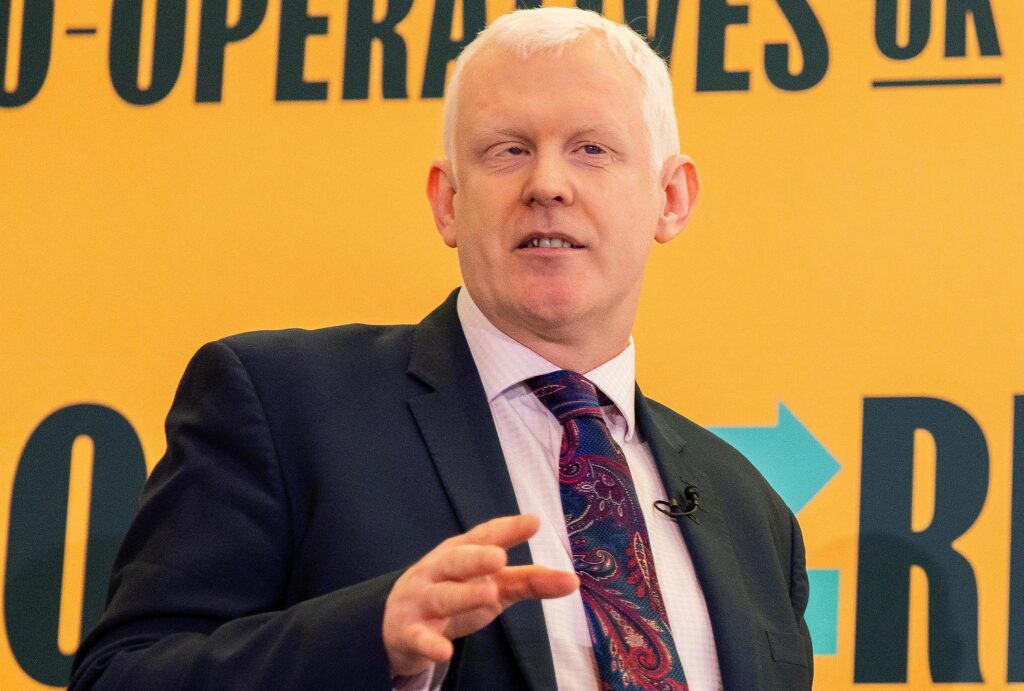The idea of co-ops competing even slightly with the FTSE 100 via a global platform might take a bit of getting used to for traditionalists. But champions of fintech platform Coop Exchange hope their ambitious initiative will change lives by fostering the growth of co-ops and mutuals across the world on a previously unthinkable scale.
Coop Exchange is well on the way to achieving its goal of transformational change in the way co-ops and mutuals are financed, by providing unparalleled access to new sources of capital. If all goes to plan over the next few years, cooperatives all over the world will be able to attract new investors via a regulated, tech-enabled stock exchange network facilitating ethical investment in co-op shares.
Aaron Stewart, with over 20 years’ legal experience, is general counsel and deputy CEO. Stewart is also a founding member of the UK Coop Law Association and a member of the Coops UK Expert Governance Panel. Passionate about co-op innovation, Stewart recently spoke at the Global Innovation Coop Summit and is currently in his final year of a master’s in Co-operative management at St Mary’s University, Canada.
“We are not the first to recognise that co-ops need capital,” says Stewart, “and without the ability to raise this type of capital we are putting co-ops at a significant disadvantage compared to other business models – just at the time when their enterprise model is needed most. We wanted to try to create a space where they can compete on a level playing field.”
To tackle this, Co-op Exchange was created – valued earlier this year at £10m following the completion of its pre-seed funding round, with Canadian insurer Co-operators leading the investment with a contribution of over CA$2m (£1.2m), acquiring a 12.4% stake.
Headquartered in London, with an EU office in Malta, its long-term goal is a network of regulated stock exchanges, listing co-operative financial instruments – bonds and equity on the global market. But backers are determined that won’t mean diluting the rights of co-op members or abandoning co-op values.
“Managing the tension between finding investors and ensuring the rights of member-owners aren’t eroded is a balance, and many coops around the world have foundered when they haven’t got that balance right,” says Stewart.
“I firmly believe the development of Coop Exchange is a significant opportunity to find a way to ease that tension.”
The operational blueprint would restrict voting rights in line with co-operative values and principles – protecting investors and the co-op movement while opening a new market for sustainable fund managers. The possibilities for true sustainable impact, Stewart believes, are enormous.
“There is an increasing appetite to do something different for the common good, and there is a lot of momentum behind this kind of change.
“Technology now is a world away from where it was 10 years ago, bringing down the costs associated with regulation but without compromising on compliance standards.”

Coop Exchange is governed by a board of eight, including former Midcounties CEO and former ICA board member Ben Reid; former MEP and former ICA president Dame Pauline Green; International Co-operative and Mutual Insurance Federation CEO and current ICA board member Shaun Tarbuck;
head of The Co-operators Corporate Venture Capital Daniel Sinclair; and Royal London CEO Barry O’Dwyer.
“Very early on we set up an expert panel of respected leaders to help challenge our thinking and guide us on a course that stays true to co-op values,” says Stewart, adding that Coop Exchange is not aiming to replace other types of co-operative capital. “If there are co-ops out there who prefer to use traditional forms of coop capital we are not here to challenge that. But it’s worth remembering, having investors in coops is possible in places like Italy.”
What makes Coop Exchange different to existing investment routes, he says, is that it aims to “build something that retains co-op autonomy, while supporting mutuals and individuals to invest in co-ops with a sustainable return”.
As things stand, it’s still early days for Coop Exchange. The next step will be recognition as a regulated crowdfunding provider – laying the groundwork for a fully-fledged co-op stock exchange.
“We are excited to be moving beyond the startup phase, and to begin operationalising what we are doing, moving from ideas to implementation, continuing to build the technology and accelerate implementation,” says Stewart.
“Having an idea is one thing, having the wherewithal to go about doing it is another. But our CEO Stephen Gill is a visionary, he moves at a whole other level and has a unique ability to get things done. He’s the technologist [Gill has been a coder and developer since the 1990s] but everything needs to be compliant and fit the regulations. There are hundreds of pages of legal requirements and it is all quite involved, which is where my legal and compliance experience comes in.”
Coop Exchange has plans to go global but will be launching first in the EU, from Malta, working
with the Maltese Financial Service Authority.
“When we first started, people thought we were crazy – but down the line, the idea of sitting on the phone with an app and investing is pretty mainstream,” says Stewart.
“Having the Co-operators join us was a real positive step forward – but while their investment was important – just as important for us was finding the right partners to help us build a truly co-operative solution.
“We don’t see ourselves as coming from outside the movement, we exist within it, building something within the movement for the movement.”